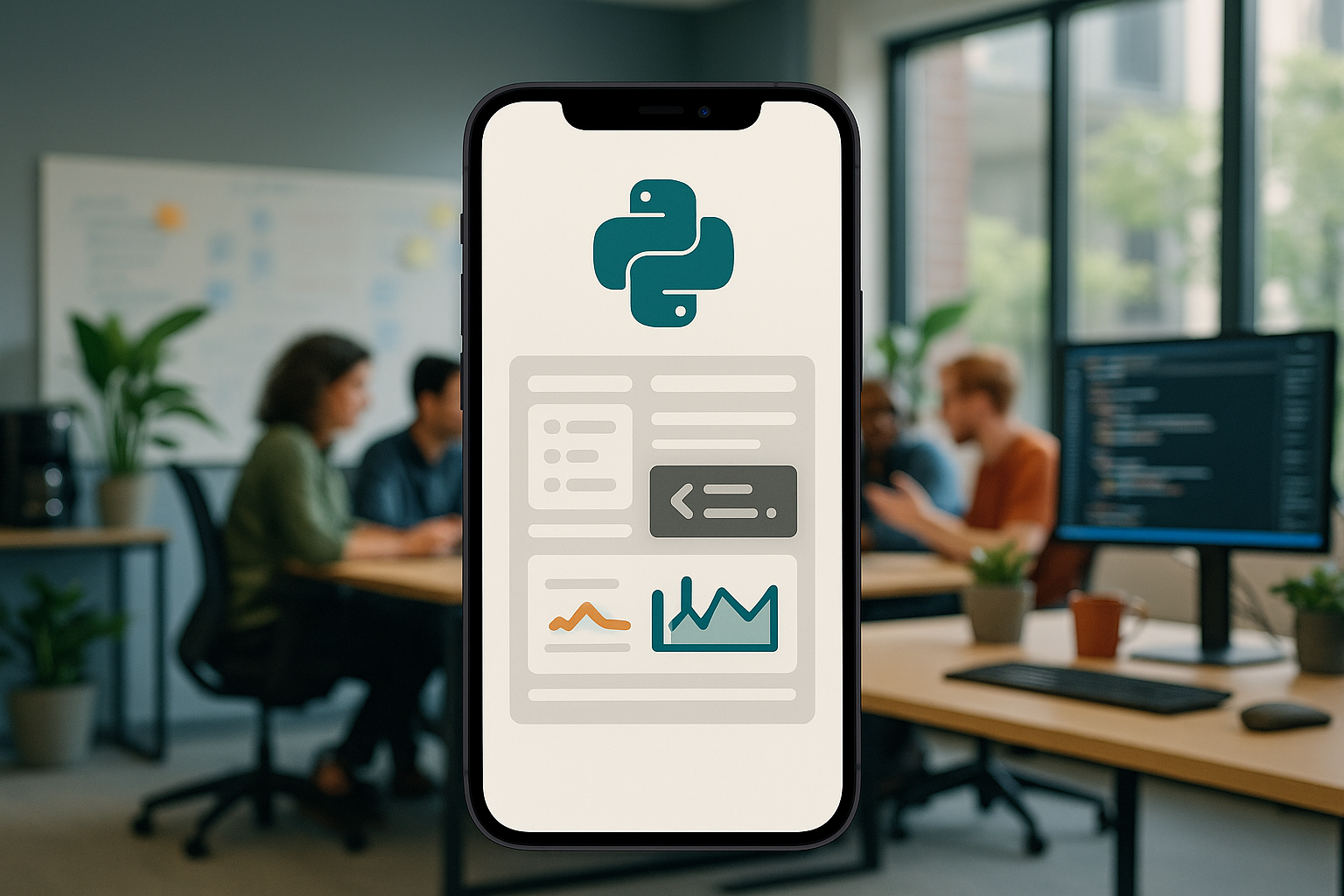Django is a powerhouse in the world of web development. As a high-level Python framework, it enables the creation of secure, scalable, and sophisticated web applications. It’s the technology behind giants like Instagram, Spotify, and Dropbox, a testament to its capability to handle massive user bases and complex operations. Yet, with great power comes great complexity. Embarking on a Django development project, especially with an in-house team new to its paradigms, can be a journey fraught with hidden pitfalls, from baffling performance bottlenecks to labyrinthine code structures.
The challenge lies in mastering Django’s opinionated nature. Its abstractions, while designed to accelerate development, can obscure critical operations, leading to inefficient code that quietly cripples performance. Debugging can become a time-consuming ordeal, and without deep expertise, projects can stall or fail to scale.
This is where a strategic partnership can redefine the path to success. This article serves as a comprehensive guide to Django app development. We will explore what a Django app is, dissect the specific difficulties of in-house development, showcase the vast array of applications it can power, and provide clear cost estimates. Furthermore, we will introduce the top Django development companies that can navigate these challenges for you.
As a top US AI-powered app development firm, we at MetaCTO have over two decades of experience turning ambitious ideas into market-leading mobile applications. We understand the intricacies of frameworks like Django and specialize in guiding our partners through every stage of development, from a Rapid MVP Development to a full-scale, monetized platform. We’re here to ensure your Django project is built the right way, from day one.
What is a Django app?
At its core, a Django application is a web application, website, or platform built using the Django framework, which is itself written in Python. Created initially to run a content-driven news website, Django was designed for rapid development of complex, database-driven websites. Its “batteries-included” philosophy means it comes with a vast collection of modules and libraries that handle common web development tasks, such as user authentication, URL routing, a templating engine, and an Object-Relational Mapper (ORM).
This comprehensive toolkit allows developers to focus on the unique aspects of their application rather than reinventing the wheel. Django is engineered to build large, customizable, secure, and scalable applications. Its versatility is one of its greatest strengths; a Django app can be a small, simple project like a basic scheduling tool, or it can be a massive, heavy-duty solution like a social media platform supporting millions of users.
The framework’s robust architecture makes it a preferred choice for projects that require a high degree of security and the ability to handle large volumes of data and traffic. It is suitable for any web service that depends on secure and reliable transactions and is designed to manage vast arrays of sensitive user data, making it a go-to for fintech, mHealth, and e-commerce platforms. From prototypes and Minimum Viable Products (MVPs) to enterprise-level content management systems, Django provides the foundation for a remarkably diverse range of digital products.
Reasons that it is difficult to develop a Django app in house
While Django’s “batteries-included” approach provides a powerful head start, its high level of abstraction and opinionated structure can create significant hurdles for development teams that lack deep-seated experience with its specific paradigms. These challenges are not superficial; they can lead to severe performance issues, bloated development timelines, and frustrating debugging cycles.
Query Performance and Obfuscation
One of the most significant challenges an in-house team often faces is mastering Django’s query performance. Understanding what happens under the hood is critical, yet Django’s design can make this surprisingly difficult.
-
The ActiveRecord Pattern and Lazy Loading: Django’s Object-Relational Mapper (ORM) uses the ActiveRecord pattern, where model classes correspond to database tables. Relationships between models are represented as lazy-loaded properties. This means that a related object is not fetched from the database until the property representing it is accessed. For a developer accustomed to writing explicit SQL queries, this pattern can be a difficult adjustment. The true cost of accessing a property is hidden, obfuscating the actual database queries being executed.
-
The N+1 Query Problem: This obfuscation frequently leads to a common and pernicious performance issue known as the “N+1 query problem.” A developer might write a loop that iterates over a list of objects (1 query) and, within that loop, accesses a related object on each one. Because of lazy loading, each access triggers a new, separate database query, resulting in N additional queries. An endpoint that should have executed two queries can easily end up running hundreds, dramatically slowing down response times. The prevalence of this issue is so significant that experienced Django shops, like Simple Thread, have found it necessary to add specific libraries like
nplusonejust to identify and flag these instances of inappropriate lazy loading. -
Difficulty in Analysis: Detecting these performance issues is complicated. Because the number and type of queries are determined by which model properties are accessed, performance analysis isn’t centralized. To find the source of an N+1 problem, a developer might have to trace the execution path through serializers, services, signals, and other models to see what is being touched. This makes performance tuning a codebase-wide investigation rather than a targeted task, representing one of the biggest hurdles in the learning process.
Implicit Logic and Code Navigation
The Django REST Framework (DRF), a popular toolkit for building web APIs with Django, introduces its own set of abstractions that can be challenging for new developers.
-
The ViewSet System: DRF’s
ViewSetclass system implicitly defines a majority of API endpoints (e.g., list, retrieve, create, update, delete) based on convention. While this speeds up initial development, it can make the codebase difficult to navigate for someone trying to understand or modify existing logic. When an endpoint is not behaving as expected, it’s not immediately clear where to look. A developer might have to hunt through theget_querysetmethod, a method field in the serializer, a permission class, or another part of the code entirely to find the source of the unexpected behavior. -
Frustration and Workarounds: This implicitness can lead to frustration. Developers new to this style often find themselves wanting to abandon the conventions and manually define every endpoint just to make the logic explicit and easier to trace. While this defeats the purpose of the framework’s productivity features, it highlights the steep learning curve associated with its “magic.”
Abstractions and Overridden Methods
Django’s models themselves can hide complex logic in places that are not immediately obvious.
-
Misused Method Overrides: Django models allow for the overriding of methods like
save()andclean(). This feature is powerful but can be easily misused. Developers can place business logic and side effects directly into these methods. For instance, asave()method on aUsermodel might be overridden to also send a welcome email or update a separate analytics service. -
Hidden Side Effects and Debugging Nightmares: This practice can lead to maddening debugging sessions. A developer writing a simple line of code like
user.save()in a test setup or interactive shell might be completely unaware that it’s also triggering an email to be sent. When a model’ssave()method performs unexpected side effects, it can take hours to trace the cause, especially in complex code that references and saves multiple different models. Even after learning to be vigilant and check for overridden methods, it remains a challenge to keep track of all potential side effects.
These deep-seated challenges demonstrate that effective Django development requires more than just knowing Python. It demands a specialized expertise born from experience. Partnering with a team like ours at MetaCTO, which has navigated these complexities across more than 120 successful projects, can be the difference between a stalled project and a successful launch. If you’re struggling with an existing Django project, our Project Rescue services are designed to diagnose these exact issues and get you back on track.
Different types of Django apps
The versatility of the Django framework is one of its most compelling attributes. It is not confined to a single niche; rather, it provides a robust foundation for a vast spectrum of applications, scaling effortlessly from simple prototypes to enterprise-grade platforms used by millions. This flexibility has made it a trusted choice for organizations and businesses across nearly every industry.
Social Media and Content Platforms
Django was born in a newsroom, and its content management capabilities remain world-class. It is the framework of choice for building dynamic, content-rich platforms and social networks that require advanced customization and scalability.
- Social Networks: Global giants like Instagram, the photo and video-sharing social network, and Pinterest, the image-sharing and discovery service, rely on Django to manage their massive scale and complex user interactions. Venmo also leverages Django, blending a payment service with a social network.
- Video and Music Streaming: YouTube, the world’s largest video-sharing platform, uses Django for some of its features. Spotify, the leading music streaming app, also uses the Django framework to power its services.
- News and Publishing: Django’s origins are honored by its continued use in the publishing world. Major newspaper websites including The Washington Post, The Guardian, and the satirical paper The Onion are built with Django. The New York Times also partially uses the framework.
AI, Machine Learning, and Big Data
In an era driven by data, Django’s integration with Python—the de facto language of data science—makes it an exceptional environment for projects involving Artificial Intelligence, Machine Learning, and Big Data.
- Django apps are extensively leveraged for these sophisticated applications, providing the web interface and API endpoints for powerful backend models.
- Google, one of the biggest data companies in the world, uses Python and Django to help power services like Google Search.
- The framework is also applied in complex fintech platforms, such as algorithmic trading and lending services, which rely on machine learning models.
Fintech, E-commerce, and Marketplaces
Security and reliability are paramount in the financial and e-commerce sectors. Django’s built-in security features and its ability to handle sensitive user data make it an ideal choice for any service requiring secure and reliable transactions.
- Fintech: Beyond algorithmic trading, Django is suitable for building online banking services. As mentioned, PayPal uses it in its Venmo app.
- E-commerce and Marketplaces: The framework can power everything from basic e-commerce platforms to complex online marketplaces for real estate, freelancing, or retail goods.
- Cloud Services: Dropbox, the popular cloud storage service, is powered primarily by Python and Django, showcasing its ability to handle large-scale data storage and management securely.
Enterprise and Niche Solutions
Django’s adaptability extends to a wide range of other specialized applications, from internal business tools to public-facing platforms.
- Health and Education: Netguru uses Django to build healthcare and mHealth solutions. E-learning platforms are another common use case.
- Collaboration and Support: The framework is used to create collaboration software. Mozilla’s support site and add-on platform are both built with Django.
- Government and Science: Even a prestigious organization like the United States National Aeronautics and Space Administration (NASA) uses Django for its website, demonstrating its reliability for high-stakes, public-facing applications.
From MVPs to complex, customizable platforms, Django has proven its mettle across a diverse landscape of web applications.
Cost estimate for developing a Django app
Estimating the cost of web application development is a critical step in project planning. While a precise figure depends on a multitude of factors—including feature complexity, design requirements, third-party integrations, and the development team’s location and experience—it’s possible to provide a general breakdown based on project scope. For applications built with the Django framework, the costs can typically be categorized into three main tiers.
1. Basic Web App: $10,000 – $20,000
This price range generally covers the development of a simple web application or a Minimum Viable Product (MVP). These projects typically have a limited number of pages, standard features, and a straightforward backend.
- Features: Basic user authentication, simple data models, static content pages, and a standard admin panel.
- Purpose: Ideal for startups looking to validate an idea, create a proof-of-concept, or launch a simple tool with a focused purpose. This aligns perfectly with a strategy to test the market quickly without a massive upfront investment.
2. Multi-page Full-fledged Solution: $20,000 – $50,000
This tier represents a more robust and feature-rich web application. These are often the core products for small to medium-sized businesses, featuring dynamic content, user interactions, and more complex business logic.
- Features: Advanced user profiles, integration with payment gateways, custom reporting dashboards, API integrations with other services, and more sophisticated data handling.
- Purpose: Suitable for established businesses looking to build a primary web platform, an e-commerce site with custom features, or a content management system tailored to their specific workflow.
3. Complex Progressive Application: $50,000 – $300,000+
This category encompasses large-scale, enterprise-grade applications with a high degree of complexity, unique features, and significant performance and security requirements.
- Features: Real-time data processing, machine learning integrations, advanced security protocols (like HIPAA compliance), complex third-party API orchestrations, custom analytics, and a highly polished, unique user experience.
- Purpose: Designed for platforms expecting high traffic volumes, such as large social networks, complex fintech platforms, or SaaS products with a wide array of interconnected activities. The upper end of this range reflects the extensive development, testing, and infrastructure management required for such projects.
At MetaCTO, we specialize in helping our partners navigate these financial decisions. We work with you to define a clear product roadmap that aligns with your budget, whether it’s launching a lean MVP in 90 days or architecting a complex, scalable system. Our expertise in AI Development and monetization strategies ensures that your investment is not just spent, but strategically deployed for maximum return.
Top Django app development companies
Choosing the right development partner is arguably the most critical decision you’ll make for your project’s success. An expert team not only writes clean, efficient code but also provides strategic guidance, mitigates risk, and transforms your vision into a robust, scalable reality. Below are some of the top Django development companies in the US, who have a proven track record of delivering exceptional Django applications.
1. MetaCTO
As an AI-enabled mobile app development agency with over 20 years of experience, we at MetaCTO stand at the intersection of innovation and execution. We have successfully launched over 120 projects, helping our clients secure over $40 million in fundraising. Our process is designed to de-risk development and accelerate your path to market, handling every step from initial concept to launch, growth, and monetization. We specialize in turning complex challenges into seamless user experiences, making us the ideal partner for your ambitious Django project. Our agile approach, which includes a 90-day MVP service, ensures you can validate your idea, gather real user feedback, and begin generating traction quickly and cost-effectively.
| Founded | Services & Expertise | Hourly Rate | Team Size | Top Clients |
|---|---|---|---|---|
| 2004 (20 years experience) | AI-enabled Mobile & Web App Development, Rapid MVP Development, Fractional CTO, Project Rescue, App Growth & Monetization | Contact for Pricing | Specialized Expert Team | ATP, The Carlyle Group, Liverpool FC, American Bible Society |
2. Caktus Group
A pioneer in the Django community, Caktus Group has been building complex web and SMS applications since 2007. They have a strong focus on creating technology for the healthcare, education, and social-impact sectors. Their agile, iterative “Success Model” prioritizes delivering high-impact features first, ensuring that projects provide value from the earliest stages. They are particularly noted for their expertise in using SMS integrations to drive engagement and scale.
| Founded | Services & Expertise | Hourly Rate | Team Size | Top Clients |
|---|---|---|---|---|
| 2007 | Django web and SMS app development, scalable architecture, enterprise support | $150–$199/hr | 10–49 | UNICEF, iN DEMAND, Discovery |
3. Eldarion
Launched in 2009, Eldarion specializes in delivering fast, API-driven Django solutions tailored for startups, research institutions, and the ed-tech space. Their core strength lies in agile MVP development and a seamless API-first design philosophy, which allows for swift deployment and robust integrations. Their portfolio includes work on tools like Open edX integrations and the conference management platform Symposion.
| Founded | Services & Expertise | Hourly Rate | Team Size | Top Clients |
|---|---|---|---|---|
| 2009 | Django backend, REST API, agile MVPs, enterprise integrations | $150–$199/hr | 10–49 | Coxx Media Group |
4. Kellton
Founded in 2008, Kellton is a global technology consulting and IT services company that merges Django development with comprehensive DevOps automation. They excel at building high-scale enterprise systems, offering deep expertise in cloud orchestration and backend integrations for major clients in healthcare, energy, and finance. Their global presence allows them to offer a more flexible price point.
| Founded | Services & Expertise | Hourly Rate | Team Size | Top Clients |
|---|---|---|---|---|
| 2008 | Django full-stack, DevOps automation, cloud infrastructure, CI/CD pipelines | $50–$99/hr | 1,000 - 9,999 | US Bank, GE Healthcare, Honeywell |
5. Imaginary Landscape
With roots going back to 1995, Imaginary Landscape is one of the most established Django development companies. Located near Chicago, they focus on developing custom, content-rich Django platforms with tailored backend logic. Their deep enterprise knowledge allows them to produce robust and scalable content management systems (CMS) for clients in demanding sectors like healthcare, publishing, and manufacturing.
| Founded | Services & Expertise | Hourly Rate | Team Size | Top Clients |
|---|---|---|---|---|
| 1995 | Django content management systems, backend customization, enterprise web apps | $100–$149/hr | 10-49 | OSF Healthcare, American Medical Association |
6. Fusionbox
Fusionbox is a boutique Django shop founded in 2001 with a strong security-first approach. Based in Denver, their senior-level team specializes in building HIPAA-grade web applications, creating custom security modules, and delivering polished UX design. They are an excellent choice for projects where data security and compliance are the highest priorities, particularly for healthcare startups and security-focused SaaS products.
| Founded | Services & Expertise | Hourly Rate | Team Size | Top Clients |
|---|---|---|---|---|
| 2001 | Secure Django app dev, security audits, UX design, staff augmentation | $150–$199/hr | 10+ | Emotional ABCs, Colorado Dept. of Health |
Conclusion
Django is an undeniably powerful and versatile framework, capable of serving as the backbone for everything from nimble MVPs to the world’s most recognizable digital platforms. Its robust architecture, security features, and scalability make it an exceptional choice for ambitious web projects. However, as we’ve explored, its very power is intertwined with complexities that can easily derail an in-house development effort. The steep learning curve associated with its abstractions, the hidden performance traps like N+1 queries, and the challenges of navigating implicit logic require a level of expertise that comes only with dedicated experience.
Throughout this guide, we have covered the fundamentals of what constitutes a Django app, dissected the common but critical difficulties of its development, showcased its vast range of applications, and provided a clear view of potential costs and top development partners. The key takeaway is that while the framework is exceptional, the success of a Django project hinges on the expertise of the team building it.
Attempting to navigate these waters without a seasoned guide can lead to costly delays, technical debt, and a final product that fails to meet its potential. By partnering with an experienced agency, you can circumvent these pitfalls entirely.
At MetaCTO, we have spent two decades mastering the art and science of application development. We bring not just technical proficiency in Django but also a strategic, product-focused mindset to every project. We are here to help you build your app the right way, from day one.
If you are ready to transform your idea into a successful, scalable, and market-ready Django application, talk with an expert at MetaCTO today. Let’s build something remarkable together.






